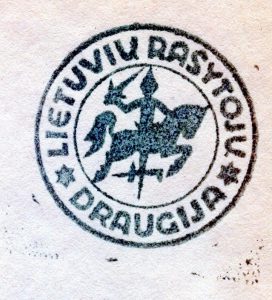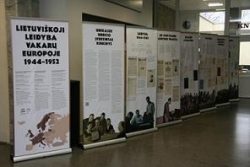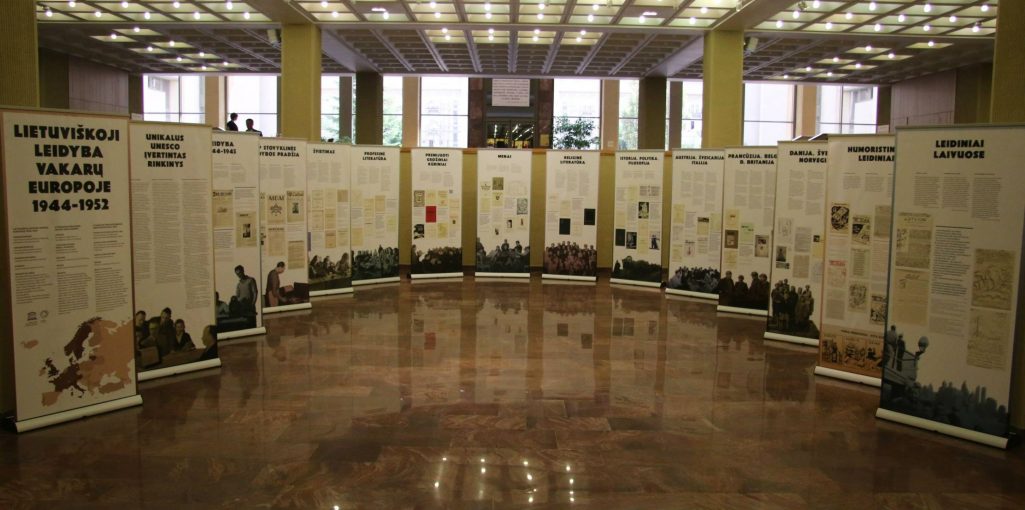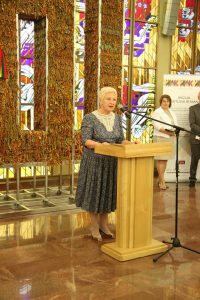
The Lithuanian Writers’ Association (LWA), established at the Faculty of Humanities of the Vytautas Magnus University in Kaunas on February 21, 1932, is the first independent organization uniting Lithuanian writers, translators, literary researchers, and critics. Active in Lithuania until 1944, the organization was restored in Germany in 1946 by Lithuanian WWII refugee writers who fled their homeland, escaping the second Soviet occupation, and was renamed the Lithuanian Refugee Authors’ Society. From 1950 until the present, the Association remains active in the United States of America.
The exhibition shows the history of the LWA through a wide variety of documents stored at the Lithuanian Research and Studies Center in Chicago, such as letters, minutes of meetings, announcements, bulletins, and other documents related to the Association’s day-to-day business, as well as photos and audio clips. These are complemented by material housed at the Martynas Mažvydas National Library of Lithuania Archive. We thank the Maironis Lithuanian Literature Museum in Kaunas and especially Virginija Paplauskienė, head of the Diaspora Literature Department, for providing useful information about Paulius Jurkus’ presidency.
The exhibition was prepared by Lithuanian Studies Department of the Martynas Mažvydas National Library of Lithuania. The exhibition’s partner – the Lithuanian Research and Studies Center, Chicago, USA.
The exhibition is also available in English: http://parodos.lnb.lt/en/exhibits/show/the-lithuanian-writers-associa
 After the successful presentations in Norway, Switzerland, and Italy, the travelling exhibition “Lithuanian Publishing in Post-WWII Europe” is back in Lithuania. On 27 January 2016 it was opened at Pasvalys Marius Katiliškis Public Library as part of a day-long event “The Library and the 21st Century Society”. Opening remarks were delivered by Jolanta Budriūnienė, head of the Lithuanian Studies Research Department (former Lituanica Department) of the National Library of Lithuania, who noted that the collection of Lithuanian DP publishing, 1945-1952, housed at the National Library of Lithuania, is of particular value for its unique content, produced under extremely difficult conditions. In 2011, it was recognized by UNESCO — the collection was included in UNESCO’s “World Memory” programme for the Lithuanian National Register. Pasvalys M. Katiliškis Public Library is only the first stop for this exhibition. Its organizer, the National Library of Lithuania, is planning to take it to all major public libraries in the country.
After the successful presentations in Norway, Switzerland, and Italy, the travelling exhibition “Lithuanian Publishing in Post-WWII Europe” is back in Lithuania. On 27 January 2016 it was opened at Pasvalys Marius Katiliškis Public Library as part of a day-long event “The Library and the 21st Century Society”. Opening remarks were delivered by Jolanta Budriūnienė, head of the Lithuanian Studies Research Department (former Lituanica Department) of the National Library of Lithuania, who noted that the collection of Lithuanian DP publishing, 1945-1952, housed at the National Library of Lithuania, is of particular value for its unique content, produced under extremely difficult conditions. In 2011, it was recognized by UNESCO — the collection was included in UNESCO’s “World Memory” programme for the Lithuanian National Register. Pasvalys M. Katiliškis Public Library is only the first stop for this exhibition. Its organizer, the National Library of Lithuania, is planning to take it to all major public libraries in the country.

 In the opening speech, the head of the Department, Jolanta Budriūnienė, talked about the idea of the exhibition – using the rich collection of Lithuanian DP Publishing, 1945-1952, housed at the National Library of Lithuania to commemorate 70 years since the mass westward flight of the Baltic Displaced Persons, refugees from war-torn Lithuania. It should be noted that in 2011, the collection was recognised as part of Lithuania’s documentary heritage and included in the UNESCO’s program “World Memory” for the Lithuanian National Register.
In the opening speech, the head of the Department, Jolanta Budriūnienė, talked about the idea of the exhibition – using the rich collection of Lithuanian DP Publishing, 1945-1952, housed at the National Library of Lithuania to commemorate 70 years since the mass westward flight of the Baltic Displaced Persons, refugees from war-torn Lithuania. It should be noted that in 2011, the collection was recognised as part of Lithuania’s documentary heritage and included in the UNESCO’s program “World Memory” for the Lithuanian National Register. The Deputy Speaker of Lithuanian Parliament and the hostess of the exhibition, Irena Degutienė, stressed that at the end of WWII, while Europe was freeing itself, in Lithuania, guerrilla fighting had only intensified and the mass deportations were taking place. Thus, it is not surprising that Lithuanian publishing, exiled from the homeland, had to establish itself in the West. “Our language was alive and will be alive, because everything depends on our willingness to speak the language, regardless of where one lives,” Degutienė concluded her speech.
The Deputy Speaker of Lithuanian Parliament and the hostess of the exhibition, Irena Degutienė, stressed that at the end of WWII, while Europe was freeing itself, in Lithuania, guerrilla fighting had only intensified and the mass deportations were taking place. Thus, it is not surprising that Lithuanian publishing, exiled from the homeland, had to establish itself in the West. “Our language was alive and will be alive, because everything depends on our willingness to speak the language, regardless of where one lives,” Degutienė concluded her speech.